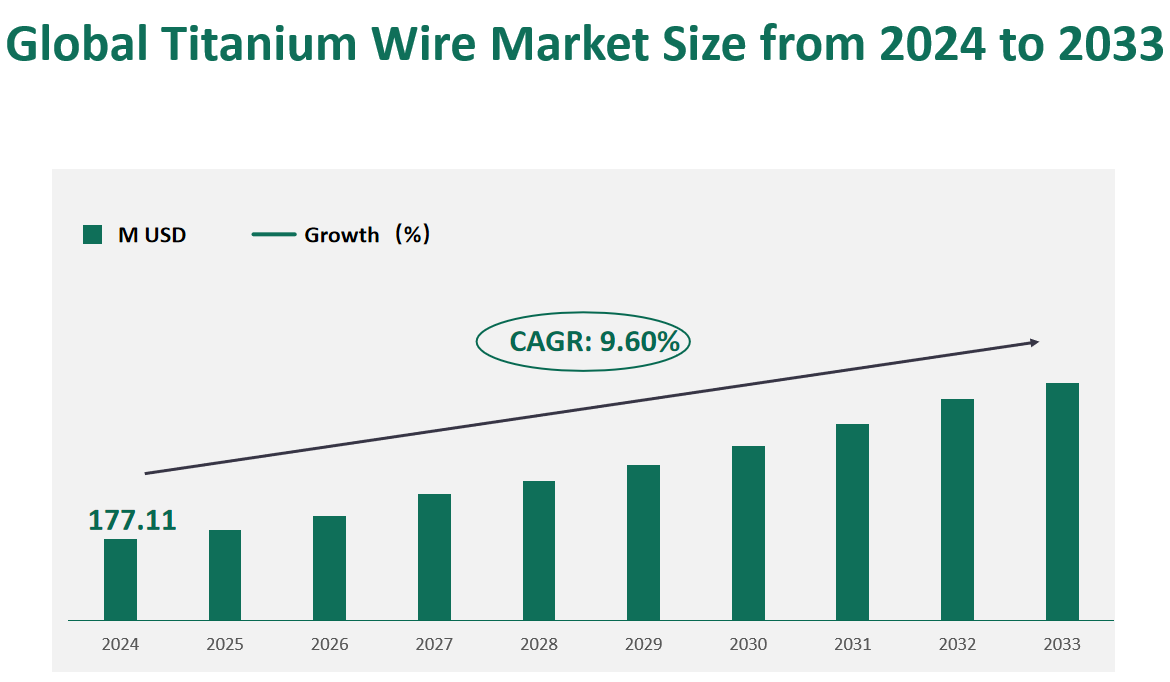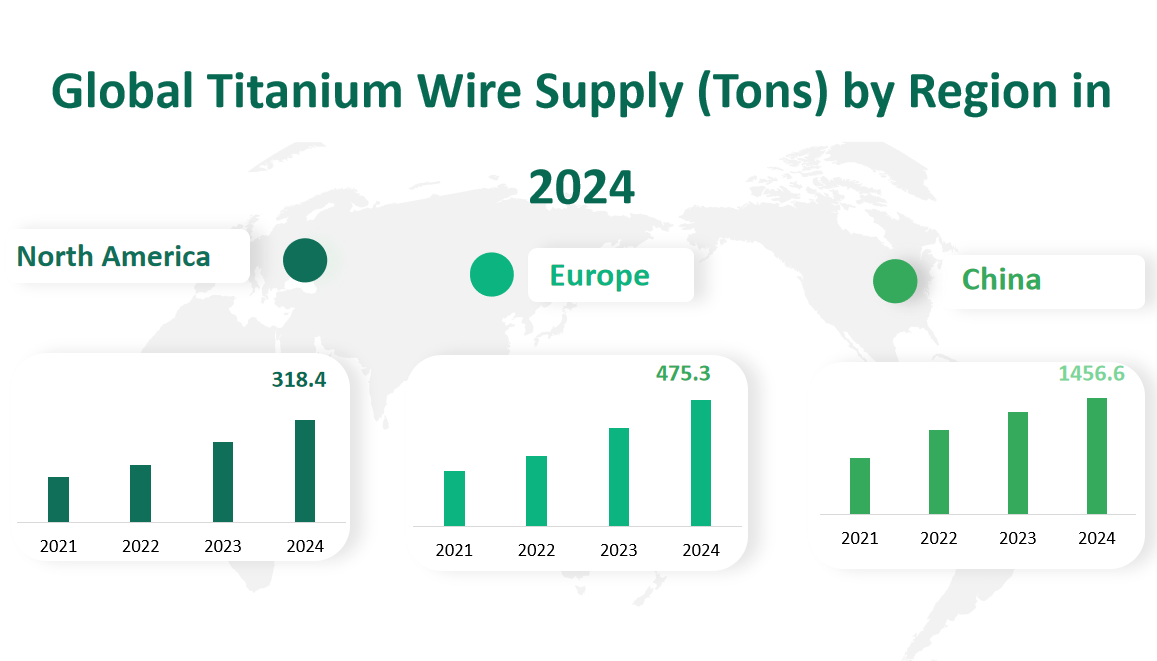1 Global Titanium Wire Market Insight Analysis
The CAGR from 2024 to 2033 is 9.60%, and the total market value of Titanium Wire Market will reach US$177.11 million in 2024.
Titanium is a silver-white metal with many excellent properties. For example, the density of titanium is 4.54g/cm3, which is 43% lighter than steel, but its mechanical strength is similar to that of steel. And titanium is resistant to high temperatures and has a melting point of 1942K, which is nearly 500K higher than steel. Titanium wire perfectly inherits the advantages of titanium and titanium alloys, with a series of excellent characteristics such as good corrosion resistance, high specific strength, non-magnetic, high biocompatibility, low impedance to ultrasound and good shape memory function. Therefore, titanium wires are widely used in many fields such as military industry, welding wires, aerospace, medical and health, and so on.
Figure Global Titanium Wire Market Size (M USD) and CAGR (2024-2033)

2 Titanium Wire Market Growth Drivers and Restraints
One of the primary drivers of the titanium wire market is the extensive application of titanium in the aerospace industry. Titanium and its alloys are renowned for their corrosion resistance, high specific strength, and biocompatibility, making them indispensable in the manufacturing of aircraft engines and other critical components. The increasing demand for fuel-efficient and lightweight aircraft has led to a surge in the use of titanium wire, thereby boosting market growth.
The medical sector has also been a significant contributor to the market’s expansion. With the superior biocompatibility of titanium, the demand for titanium wire in implants, prosthetics, and other medical devices is on the rise. Additionally, the growing awareness of the benefits of titanium in medical applications has further fueled market growth.
Technological advancements have played a crucial role in propelling the market forward. Innovations in titanium wire production processes, such as additive manufacturing and advanced welding techniques, have improved the efficiency and quality of titanium wire products. These advancements have not only expanded the application scope of titanium wire but also reduced production costs, making it more accessible to a broader range of industries.
Despite the promising growth, the titanium wire market faces certain constraints. The high cost of raw materials and the complexity of the smelting process pose significant challenges. The market is also affected by the uneven distribution of titanium resources, with the majority of reserves concentrated in a few countries, leading to supply chain vulnerabilities.
Technical barriers are another factor restricting the market’s potential. The production of titanium wire requires sophisticated technology and skilled labor, which can be a barrier for new entrants and may limit the market’s growth. Additionally, the market faces competition from alternative materials that offer similar properties at a lower cost, such as aluminum-lithium alloys and composite materials.
Environmental regulations and the push for sustainability also impact the market. The need for cleaner production methods and the disposal of titanium waste pose challenges for manufacturers, adding to the operational costs and potentially affecting the market’s growth.
3 Technological Innovations and Mergers in the Titanium Wire Market
Innovations in the titanium wire market are driven by the need for higher performance materials in critical applications. Advancements in aero-engine technology have led to the development of titanium alloys with improved strength and weight ratios. These innovations are not only limited to material science but also extend to manufacturing processes. For instance, additive manufacturing (3D printing) has allowed for the creation of complex titanium wire structures with enhanced properties, reducing waste and production times.
The integration of digital technologies, such as the Internet of Things (IoT) and big data analytics, has improved supply chain efficiency and product quality control. These technologies enable real-time monitoring and optimization of production processes, ensuring consistency and reliability in titanium wire products.
Mergers and acquisitions have played a significant role in the titanium wire market, allowing companies to expand their reach, enhance their product portfolios, and gain access to new technologies. For example, the joint venture between TVEL FUEL COMPANY OF ROSATOM and Hermith GmbH to produce titanium for aviation marks a significant step in the industry’s consolidation and expansion into new markets.
These strategic moves have not only helped companies to strengthen their market positions but also to address the challenges posed by the uneven distribution of titanium resources. By acquiring or merging with companies in regions rich in titanium resources, businesses can secure their supply chains and reduce operational risks.
In conclusion, the global titanium wire market is at the crossroads of growth and challenges, with technological advancements and strategic business decisions playing crucial roles in shaping its future. As the market continues to evolve, it will be interesting to see how these dynamics play out and influence the industry’s trajectory.
4 Global Titanium Wire Market Size by Type
Pure titanium wire, known for its high corrosion resistance and biocompatibility, is expected to hold a significant share in the market. In 2024, the revenue generated by pure titanium wire is forecasted to be $56.46 million USD, showing a steady increase from the previous years. This type of wire is widely used in the medical sector, particularly in implants and prosthetics, due to its non-toxic nature and resistance to body fluids.
Titanium alloy wire, on the other hand, is anticipated to dominate the market in terms of revenue. With its superior strength-to-weight ratio and excellent mechanical properties, titanium alloy wire is predicted to generate a revenue of $120.65 million USD in 2024. This type of wire is extensively used in the aerospace industry for manufacturing aircraft engines, wings, and other critical components that require high strength and low weight. Its dominance in the market is highlighted owing to the growing demand from aerospace sector and other high-performance applications.
Table Global Titanium Wire Market Size by Type in 2024
Type | Market Size (M USD) 2024 |
|---|---|
Pure Titanium Wire | 56.46 |
Titanium Alloy Wire | 120.65 |
5 Global Titanium Wire Market Size by Application
The aerospace sector is anticipated to be the leading application for titanium wire, with a projected revenue of $68.92 million USD in 2024. This application accounts for a significant share of the market, reflecting the increasing demand for lightweight and durable materials in aircraft manufacturing. The growth in this sector is attributed to the rising global air travel and the need for fuel-efficient aircraft, which titanium wire can provide through its high strength-to-weight ratio.
The medical application is another substantial segment, with an expected revenue of $58.42 million USD in 2024. Titanium wire is valued in the medical field for its biocompatibility, making it ideal for implants, prosthetics, and other medical devices. The increasing aging population and advancements in medical technology are key factors contributing to the growth of this application.
Table Global Titanium Wire Market Size by Application in 2024
Application | Market Size (M USD) 2024 |
|---|---|
Aerospace | 68.92 |
Medical | 58.42 |
Others | 49.78 |
6 Global Titanium Wire Market Size by Region
North America, with its well-established industrial sector and strong presence in the aerospace and automotive industries, is expected to have a substantial market supply. In 2024, the region’s supply is projected to be approximately 318.4 tons. The region’s development status is characterized by a mature market with a focus on innovation and technological advancements. The United States, being a key driver in this region, continues to invest in the research and development of new materials, which contributes to the growth of the titanium wire market.
Europe, known for its advanced manufacturing and stringent environmental regulations, is projected to have a market supply of 475.3 tons in 2024. The region’s development status reflects a commitment to sustainability and lightweight materials in transportation, which has led to an increased demand for titanium wire. Countries like Germany, the UK, and France are at the forefront of this trend, with their focus on high-tech industries and material efficiency.
China’s rapid industrial growth and investment in high-performance materials have positioned it as a significant player in the titanium wire market. The supply in China is expected to reach 1456.6 tons in 2024. The country’s development status is marked by rapid expansion in infrastructure, aerospace, and defense sectors, which are key drivers of the titanium wire market. China’s push for self-sufficiency in high-tech materials and its growing middle class, with increasing demand for high-quality products, further stimulates the market.
Japan, with its strong automotive and aerospace industries, is expected to have a market supply of 616.8 tons in 2024. The country’s development status is characterized by a focus on precision engineering and high-quality manufacturing. Japan’s commitment to technological innovation and its established supply chains make it a key supplier of titanium wire in the Asia-Pacific region.
India, with its burgeoning economy and rapid industrial growth, is expected to have a market supply of 119.7 tons in 2024. The country’s development status reflects a growing demand for titanium wire in various industries, including automotive, aerospace, and healthcare. India’s large population and increasing middle class are driving factors for the demand for high-performance materials like titanium wire.
Figure Global Titanium Wire Supply (Tons) by Region in 2024

7 Global Titanium Wire Market Analysis by Major Players
7.1 Yunnan Titanium
Company Introduction and Business Overview:
Yunnan Titanium, established in 2009 and headquartered in China, is a leading company in the titanium industry with a strong presence in Asia and Europe. The company is known for its commitment to research and development, production, and sales of titanium materials.
Yunnan Titanium specializes in the production of titanium and titanium alloy ingot materials. They have a significant role in the global titanium market, particularly in the aerospace and medical sectors, where high-quality titanium materials are crucial.
Products:
The company offers a range of titanium and titanium alloy wires that are used in various applications due to their excellent properties such as corrosion resistance and high strength.
7.2 Tokusen Kogyo Co. , Ltd
Company Introduction and Business Overview:
Established in 1934, Tokusen Kogyo Co., Ltd is a Japan-based company with a long history of manufacturing and sales of specialty metal wires, including titanium wire. The company has a significant market presence in Asia and North America.
Tokusen Kogyo Co., Ltd is renowned for its high-quality titanium wire products, which are used in a variety of applications, from automobile tires to precision instruments. The company’s focus on innovation and quality has solidified its position in the market.
Products:
The company’s product lineup includes Tokusen Titanium Wire, known for its thinnest grade production of 50μm and its “oxide film removal products,” which enhance the surface quality of titanium wire.
7.3 J&Ti
Company Introduction and Business Overview:
J&Ti, founded in 2010 and based in China, is a professional enterprise engaged in the research and development, production, and sales of titanium and titanium alloy materials. The company’s products are widely used across various industries, including additive manufacturing, biomedical, aerospace, military, and chemical.
J&Ti has established itself as a major supplier of titanium materials, offering a comprehensive range of products from titanium ingots to forgings. The company’s focus on innovation and the development of new titanium applications has been a key factor in its success.
Products:
J&Ti provides a variety of titanium wire products, including grades TC4ELI, TC4, and TA2, in different diameters and forms to cater to the specific needs of its diverse customer base.

